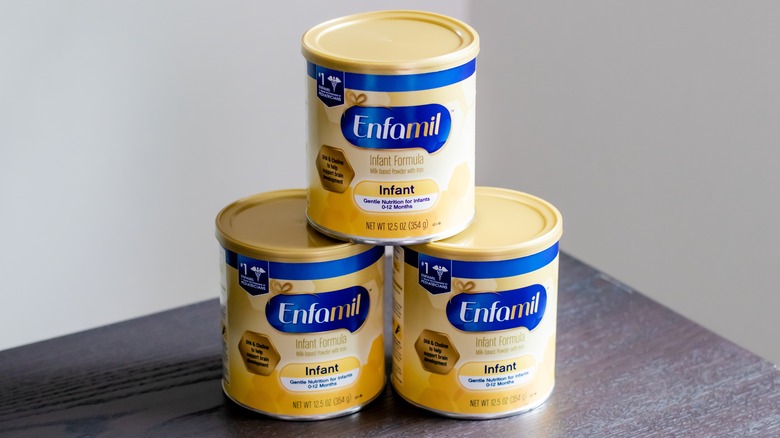Why The Baby Formula Shortage Isn't Actually Over Yet
If you scan the headlines, you can be forgiven for thinking that the baby formula shortage — which caught the country by surprise at the beginning of 2022 — had been resolved. But that, unfortunately, would be news for the moms who are still struggling to find formula to feed their infants. Per USA Today, mothers continue to flood social media with requests for help over where to find formula, with one mom telling the publication that she and others like her continue to be worried about where future supplies might be coming from. "Right now, it's just crazy," she said.
Back in October, NPR reported that infant formula production had rebounded since the crisis first broke, with shelf stocks at 87%, compared to 88% to 90%. Unfortunately, the statistics don't show the hardship mothers go through on the ground to find milk, particularly in rural areas, where some say they see "mostly empty shelves, altogether. And then the options are very limited on which (type of formula) you can pick."
And it appears the problem hasn't really improved since then. As CEO of the consumer advocacy group Stop Foodborne Illness Mitzi Baum explained to USA Today, "It's still impacting consumers. If you ask the FDA, they say everything is OK. But if you ask the new mother or the Facebook group that, they still can't find it, or even in your neighborhood, it is still a problem."
Enfamil maker sees shortage until spring of 2023
Unfortunately, moms aren't likely to get much relief from worrying over formula supplies this holiday season, because while U.S. manufacturers have been able to make some headway into raising stock levels, British health and nutrition products manufacturer Reckitt Benckiser — which makes Enfamil — tells Reuters that manufacturers still have some way to go to get supplies to where they need to be. Robert Cleveland, the company's senior vice president of North America and Europe Nutrition, explained that the shortage could last as long as spring 2023.
To meet this chronic shortfall, Cleveland says Reckitt factories are now running 24 hours a day, seven days a week. He says the situation is much better than it was some months back, and that there was now enough to "feed America's babies." But the company expects to scale back at some stage and is relying on the U.S. Department of Agriculture to let them know if and when inventory levels return to normal.
According to USA Today, 75% of infant caregivers use formula from when the baby is born until they are 6 months old, so it's vitally important that the supply is restored.

